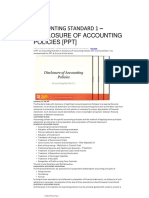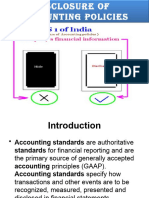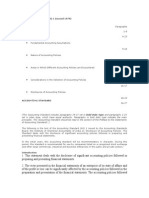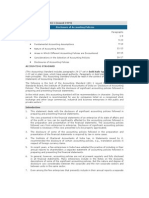As1 Ca
As1 Ca
Uploaded by
Đėvıł ĶıñgCopyright:
Available Formats
As1 Ca
As1 Ca
Uploaded by
Đėvıł ĶıñgOriginal Title
Copyright
Available Formats
Share this document
Did you find this document useful?
Is this content inappropriate?
Copyright:
Available Formats
As1 Ca
As1 Ca
Uploaded by
Đėvıł ĶıñgCopyright:
Available Formats
AS 1 – Disclosure of Accounting Policies
This standard deals with the disclosure of significant accounting policies followed in preparing and presenting
financial statements.
• Introduction
• Fundamental Accounting Assumptions
• Nature of Accounting Policies
• Areas in which differing Accounting Policies are possible
• Considerations in the Selection of Accounting Policies
• Disclosure of Accounting Policies
• Points to remember
The purpose of this standard is to promote better understanding of financial statements by establishing the
practice of disclosure of significant accounting policies followed and the manner in which they are disclosed
in the financial statements. Such disclosure would also facilitate a more meaningful comparison between
financial statements of different organisations.
Fundamental Accounting Assumptions
Certain assumptions are used in the preparation of financial statements. They are usually not specifically stated
because they are assumed to be followed. Disclosure is necessary only if they are not followed.
The following have been generally accepted as fundamental accounting assumptions:
Going Concern
The organisation is normally viewed as a going concern, that is to say, it will be in continuing operations for the
foreseeable future. It is assumed that the organisation has neither the
intention, nor the necessity of shutting down or reducing the scale of operations.
Consistency
It is assumed that accounting policies are consistently followed from one period to another. No frequent changes are
expected.
Accrual
Revenues and costs are recorded when they are earned or incurred (and not as money is received or paid) in the
periods to which they relate.
Nature of Accounting Policies
Accounting policies refer to accounting principles and the methods of applying these principles adopted by the
organisation in the preparation of their financial statements.
There is no single list of accounting policies which are applicable in all circumstances. The different circumstances in
which organisations operate make alternative accounting principles acceptable. The choice of the appropriate
accounting principles calls for a large degree of judgement by the management of the organisation.
Areas in which differing Accounting Policies are possible
The following are examples of areas in which different accounting policies may be adopted by organisations.
1. Methods of depreciation, depletion and amortisation
2. Treatment of expenditure during construction
3. Conversion or translation of foreign currency items
4. Valuation of inventories
5. Treatment of goodwill
6. Valuation of investments
7. Treatment of retirement benefits
8. Recognition of profit on long-term contracts
9. Valuation of fixed assets
10. Treatment of contingent liabilities
G.N Joshi classes
Considerations in the Selection of Accounting Policies
The primary consideration in the selection of accounting policies by an organisation is that the financial statements
should represent a true and fair picture of the financial position for the period.
For this purpose, the major considerations governing the selection and application of accounting policies are:
Prudence
In view of the uncertainty of future events, profits are not anticipated but recognised only when earned, though not
necessarily in cash. However, provision is made for all known liabilities and losses even though the amount cannot
be determined with certainty and represents only an estimate.
Substance over Form
The accounting treatment and presentation of transactions and events in financial statements should be governed by
their substance and not merely by the legal form.
Materiality
Financial statements should disclose all “material” items, i.e. items, the knowledge of which might influence the
decisions of the user of the financial statements.
Disclosure of Accounting Policies
To ensure proper understanding of financial statements, it is necessary that all significant accounting policies
adopted in the preparation and presentation of financial statements must be disclosed.
Such disclosure should form part of the financial statements.
It would be helpful to the reader of financial statements if they are all disclosed in one place instead of being
scattered over several statements, schedules and notes.
Any change in an accounting policy which has a significant effect should be disclosed. The amount by which any
item in the financial statements is affected by such change should also be disclosed to the extent it can be
calculated. Where such amount is not ascertainable, wholly or in part, the fact should be disclosed. If a change is
made in the accounting policies which has no material effect on the financial statements for the current period but is
expected to have a material effect in later periods, the fact of such change should be appropriately disclosed in the
period in which the change is adopted.
Points to remember
• All significant accounting policies used in the preparation and presentation of financial statements
should be disclosed.
• The disclosure should form part of the financial statements, normally in one place.
• Any change in the accounting policies which has a material effect in the current period or is
expected to have a material effect in later periods should be disclosed.
In case of a change in accounting policies which has a material effect in the current period, the
amount by which any item in the financial statements is affected should also be disclosed to the
extent it can be calculated. Where such amount is not ascertainable, wholly or in part, the fact
should be indicated.
• If the fundamental accounting assumptions of Going Concern, Consistency and Accrual are
followed in financial statements, specific disclosure is not required. If a fundamental accounting
assumption is not followed, the fact should be disclosed.
Question to be solved
a. What are the three fundamental accounting assumptions recognised by AS 1 ? briefly
describe each of them.
b. Mention few areas in which different accounting policies are followed by companies.
G.N Joshi classes
You might also like
- Chap2 As 1 Disclosure of Accounting PoliciesDocument3 pagesChap2 As 1 Disclosure of Accounting PoliciesAashutosh PatodiaNo ratings yet
- AS-1 Disclosure of Accounting Policies: CMA S. BaskaranDocument11 pagesAS-1 Disclosure of Accounting Policies: CMA S. BaskaranS. BaskaranNo ratings yet
- Accounting Standard PoliciesDocument4 pagesAccounting Standard Policiesashishoraon789835No ratings yet
- Finance Project PrintDocument23 pagesFinance Project PrintYash ParekhNo ratings yet
- Accounting Standard 1 PDFDocument4 pagesAccounting Standard 1 PDFChristopher Jacob MurmuNo ratings yet
- Accounting Standard 1Document7 pagesAccounting Standard 1api-3828505No ratings yet
- As 1Document20 pagesAs 1dilipupadhyay1979No ratings yet
- AS 1 Disclosure of Accounting PoliciesDocument6 pagesAS 1 Disclosure of Accounting PoliciesAnanya SharmaNo ratings yet
- As-1: Disclosure of Accounting Policies: ObjectivesDocument58 pagesAs-1: Disclosure of Accounting Policies: ObjectivesAshutosh SinghNo ratings yet
- As-1 Disclosure of Accounting PoliciesDocument7 pagesAs-1 Disclosure of Accounting PoliciesPrakash_Tandon_583No ratings yet
- Presentation On Accounting Standard 1Document9 pagesPresentation On Accounting Standard 1ritusexyNo ratings yet
- Accounting Standard (AS) 1 (Issued 1979) : Disclosure of Accounting PoliciesDocument5 pagesAccounting Standard (AS) 1 (Issued 1979) : Disclosure of Accounting PoliciesSuhasini GummeNo ratings yet
- Accounting Standards (As) and International Financial Reporting StandardsDocument34 pagesAccounting Standards (As) and International Financial Reporting StandardsSD gamingNo ratings yet
- 13.2 AS 1 Disclosure of Accounting PoliciesDocument4 pages13.2 AS 1 Disclosure of Accounting PoliciesRohith KumarNo ratings yet
- Disclosure of Accounting PoliciesDocument7 pagesDisclosure of Accounting PoliciesgimmyjoyNo ratings yet
- Disclosure of Accounting PoliciesDocument7 pagesDisclosure of Accounting PoliciesSatesh Kumar KonduruNo ratings yet
- Inbound 3522308407029868205Document18 pagesInbound 3522308407029868205KupalNo ratings yet
- Accounting Standard (AS) 1: (Issued 1979)Document7 pagesAccounting Standard (AS) 1: (Issued 1979)anoop_mishra1986No ratings yet
- AS 1: Disclosure of Accounting Policies: IPCC Paper 1: Accounting Chapter 1 Unit 2Document31 pagesAS 1: Disclosure of Accounting Policies: IPCC Paper 1: Accounting Chapter 1 Unit 2sam hajamatNo ratings yet
- Accounting Standards 3rd Unit NotesDocument11 pagesAccounting Standards 3rd Unit NotesmailatthepenparadiseNo ratings yet
- Final CHP T 2Document152 pagesFinal CHP T 2Marikrishna Chandran CA100% (1)
- ACCOUNTING STANDARD-1: Some Salient Features: Considerations in The Selection of Accounting PoliciesDocument4 pagesACCOUNTING STANDARD-1: Some Salient Features: Considerations in The Selection of Accounting PoliciesAbhijeet DashNo ratings yet
- Disclosure of Accounting PoliciesDocument8 pagesDisclosure of Accounting Policiesabdullah0331No ratings yet
- Accounting Standard (As) 1 Disclosure Ofaccounting Policies: (Issued 1979)Document3 pagesAccounting Standard (As) 1 Disclosure Ofaccounting Policies: (Issued 1979)Sonali PuriNo ratings yet
- Acc 1Document3 pagesAcc 1navi4s3No ratings yet
- What Is Accounting PrinciplesDocument17 pagesWhat Is Accounting PrinciplesvicenteferrerNo ratings yet
- Accounting PoliciesDocument4 pagesAccounting PoliciesNaresh PalabandlaNo ratings yet
- Accounting Standard TahirDocument3 pagesAccounting Standard TahirJunaid TariqNo ratings yet
- As1-Diclosure of Accounting PoliciesDocument6 pagesAs1-Diclosure of Accounting PoliciesDharmesh MistryNo ratings yet
- As - 1Document15 pagesAs - 1shagunpandat303No ratings yet
- 1 As Disclouser of Accounting PoliciesDocument6 pages1 As Disclouser of Accounting Policiesanisahemad1178No ratings yet
- Accounting PoliciesDocument6 pagesAccounting PoliciesShalini TiwariNo ratings yet
- Accounting Standard: 1: Disclosure of Accounting PoliciesDocument6 pagesAccounting Standard: 1: Disclosure of Accounting PoliciesAbhinav AggarwalNo ratings yet
- Accounting Standard (AS) 1 (Issued 1979) : Disclosure of Accounting PoliciesDocument4 pagesAccounting Standard (AS) 1 (Issued 1979) : Disclosure of Accounting Policiessaradindu123No ratings yet
- Module 014 Week005-Statement of Changes in Equity, Accounting Policies, Changes in Accounting Estimates and ErrorsDocument9 pagesModule 014 Week005-Statement of Changes in Equity, Accounting Policies, Changes in Accounting Estimates and Errorsman ibeNo ratings yet
- Chapter 6 - Accounting Concepts and PrinciplesDocument19 pagesChapter 6 - Accounting Concepts and PrinciplesRyah Louisse E. ParabolesNo ratings yet
- Accounting PrinciplesDocument12 pagesAccounting PrinciplesBalti MusicNo ratings yet
- Accounting Policies: Accounting Policies Are The Specific Accounting Principles and The Methods of Applying ThoseDocument1 pageAccounting Policies: Accounting Policies Are The Specific Accounting Principles and The Methods of Applying Thosekarishma10No ratings yet
- CBS FA Day 3Document28 pagesCBS FA Day 3Samarpan RoyNo ratings yet
- CBS FSR Day 2Document21 pagesCBS FSR Day 2Samarpan RoyNo ratings yet
- Workbook 6 (July 2022)Document60 pagesWorkbook 6 (July 2022)Sansaar KandhroNo ratings yet
- Accounting PoliciesDocument8 pagesAccounting Policiesvijila2003No ratings yet
- Advancd Acc Ca Inter cp-4Document15 pagesAdvancd Acc Ca Inter cp-4Pooja Suresh BNo ratings yet
- Accounting Standard - 1: Disclosure of Accounting PoliciesDocument8 pagesAccounting Standard - 1: Disclosure of Accounting PoliciesAshish TayalNo ratings yet
- 4.accounting StandardsDocument3 pages4.accounting StandardsbouhaddihayetNo ratings yet
- SFAC No 5Document28 pagesSFAC No 5Clara Indira PurnamasariNo ratings yet
- Financial AccountingDocument9 pagesFinancial Accountinghvr.harshvardhanraohvrNo ratings yet
- Unit 6 - Accounting Concepts Standards-1Document20 pagesUnit 6 - Accounting Concepts Standards-1evalynmoyo5No ratings yet
- Accounting StandardsDocument5 pagesAccounting StandardsAkwasi Addai BoatengNo ratings yet
- AS-1: Disclosure of Accounting Policies 1Document9 pagesAS-1: Disclosure of Accounting Policies 1Aishwary BhandariNo ratings yet
- Accounting Standard 1Document27 pagesAccounting Standard 1Sid2875% (4)
- "The Language of Business: How Accounting Tells Your Story" "A Comprehensive Guide to Understanding, Interpreting, and Leveraging Financial Statements for Personal and Professional Success"From Everand"The Language of Business: How Accounting Tells Your Story" "A Comprehensive Guide to Understanding, Interpreting, and Leveraging Financial Statements for Personal and Professional Success"No ratings yet
- Master Budgeting and Forecasting for Hospitality Industry-Teaser: Financial Expertise series for hospitality, #1From EverandMaster Budgeting and Forecasting for Hospitality Industry-Teaser: Financial Expertise series for hospitality, #1No ratings yet
- DK Essential Managers: Understanding AccountsFrom EverandDK Essential Managers: Understanding AccountsRating: 4 out of 5 stars4/5 (2)
- Engagement Essentials: Preparation, Compilation, and Review of Financial StatementsFrom EverandEngagement Essentials: Preparation, Compilation, and Review of Financial StatementsNo ratings yet
- Finance for Nonfinancial Managers: A Guide to Finance and Accounting Principles for Nonfinancial ManagersFrom EverandFinance for Nonfinancial Managers: A Guide to Finance and Accounting Principles for Nonfinancial ManagersNo ratings yet
- PVAT Rules, 2007 With Gazette NotificationDocument54 pagesPVAT Rules, 2007 With Gazette NotificationsaaisunilNo ratings yet
- Capital Structure and Long-Term Financing DecisionsDocument4 pagesCapital Structure and Long-Term Financing DecisionsJade Berlyn AgcaoiliNo ratings yet
- Answers To Chapter 13 QuestionsDocument7 pagesAnswers To Chapter 13 QuestionsLe QuangNo ratings yet
- 3rd Quizzer 1st Sem SY 2020-2021 - AKDocument6 pages3rd Quizzer 1st Sem SY 2020-2021 - AKMitzi WamarNo ratings yet
- EM Bond List Oct - 12Document257 pagesEM Bond List Oct - 12Nicolas Canales MironesNo ratings yet
- Assgmt1 2 ProbDocument14 pagesAssgmt1 2 ProbSyurga Fathonah0% (2)
- Bs Assginment 1 (g18) LatestDocument14 pagesBs Assginment 1 (g18) LatestNur Syuhadah SapawiNo ratings yet
- Calculation of PensionDocument3 pagesCalculation of PensionAnwar BokhariNo ratings yet
- Wollo University: Department of Management, Master of Business Adminstration ProgramDocument29 pagesWollo University: Department of Management, Master of Business Adminstration ProgramTesfamariam AbateNo ratings yet
- Ias 2Document5 pagesIas 2nnwritiNo ratings yet
- Lost Stock Certificate, Affidavit ofDocument2 pagesLost Stock Certificate, Affidavit ofShehzad AhmedNo ratings yet
- RL R.% - R. N : Rga, A/"Document4 pagesRL R.% - R. N : Rga, A/"Vince De GuzmanNo ratings yet
- R38 Dividends and Share Repurchases Basics Q BankDocument12 pagesR38 Dividends and Share Repurchases Basics Q BankAhmedNo ratings yet
- Swot AnalysisDocument5 pagesSwot AnalysisZara KhanNo ratings yet
- OPaL OPD Claim Form For 2017-18Document2 pagesOPaL OPD Claim Form For 2017-18curaajNo ratings yet
- Angel Bootcamp Sales Letter 3Document21 pagesAngel Bootcamp Sales Letter 3Sofy AndersonNo ratings yet
- RBI/DCBR/2015-16/23 Master Direction DCBR - Dir.No.1/13.01.000/2015-16Document19 pagesRBI/DCBR/2015-16/23 Master Direction DCBR - Dir.No.1/13.01.000/2015-16Vasu Ram JayanthNo ratings yet
- # 17,, New Delhi 110021, India Payment File: RBI-DEL/id1033/13 Payment Amount: 500,000.00GBP Reserve Bank of India Official Payment NotificationDocument2 pages# 17,, New Delhi 110021, India Payment File: RBI-DEL/id1033/13 Payment Amount: 500,000.00GBP Reserve Bank of India Official Payment NotificationparthaNo ratings yet
- Bill FormetDocument1 pageBill Formetshuklavishal135No ratings yet
- TATA Mutual Fund P2P Returns June 2024Document3 pagesTATA Mutual Fund P2P Returns June 2024Atish PandaNo ratings yet
- Texas LLC Update 0509141033Document43 pagesTexas LLC Update 0509141033tortdogNo ratings yet
- Anne Scheiber's BonanzaDocument5 pagesAnne Scheiber's BonanzaomerumeromerNo ratings yet
- Presentation On: Types of CostDocument18 pagesPresentation On: Types of CostAnonymous 1ClGHbiT0JNo ratings yet
- 2017-10 - Council Minutes October 2017Document58 pages2017-10 - Council Minutes October 2017The ExaminerNo ratings yet
- Date (Value Date) Narration Ref/Cheque No. Debit Credit BalanceDocument5 pagesDate (Value Date) Narration Ref/Cheque No. Debit Credit BalanceanubhaNo ratings yet
- CE02NDZVDocument157 pagesCE02NDZVnipunNo ratings yet
- Westside BillDocument3 pagesWestside BillVamsee309No ratings yet
- Reconstruction Finance Corp. v. Kaplan in Re Waltham Watch Co, 185 F.2d 791, 1st Cir. (1951)Document11 pagesReconstruction Finance Corp. v. Kaplan in Re Waltham Watch Co, 185 F.2d 791, 1st Cir. (1951)Scribd Government DocsNo ratings yet
- JD - Evalueserve - Index QuantsDocument2 pagesJD - Evalueserve - Index QuantsakphoneskyNo ratings yet
- Avoid Forclosure Door HangerDocument4 pagesAvoid Forclosure Door HangerStephen PowellNo ratings yet

























































































